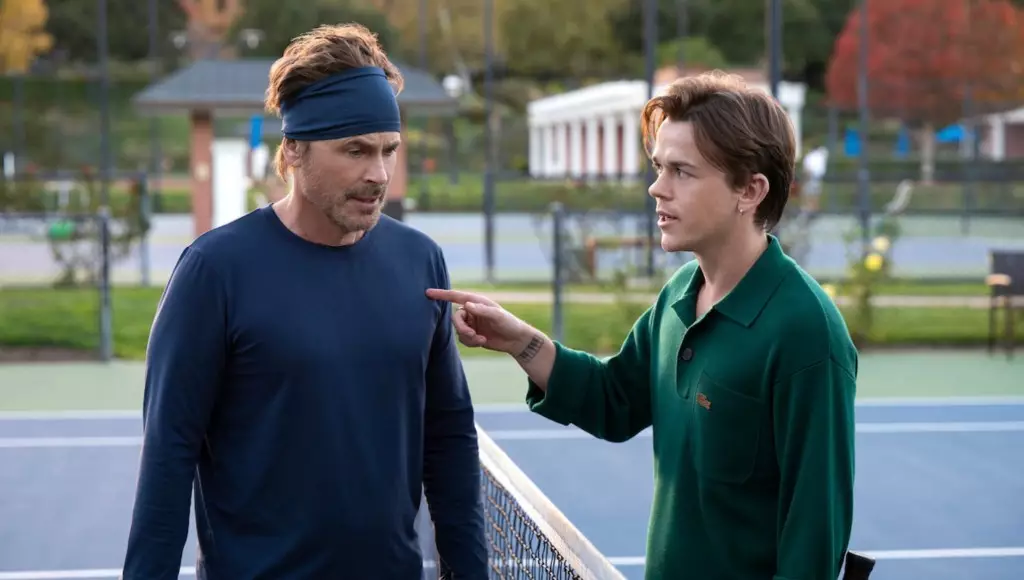As the streaming landscape continues to evolve, so too do the fortunes of various shows vying for audience attention. One notable casualty in this ever-competitive arena is Netflix’s comedy series, *Unstable*. The show was co-created by prominent actor Rob Lowe and his son, John Owen Lowe, and despite its promising premise, it has been announced that Netflix will not be moving forward with a third season. This decision, reported to the crew, is indicative of broader trends in the streaming industry, particularly concerning original comedy productions.
*Unstable*, which debuted its second season on August 1, struggled significantly, failing to penetrate the Netflix Top 10 charts. In its opening weekend, the show garnered fewer than 1.4 million views, with even less interest showing as the weeks unfolded—only 1.3 million views during its first full week. This alarming trend prompted Netflix executives to carefully evaluate the series for renewal. Their approach predominantly hinges on a formula that weighs viewership metrics against production costs. Unfortunately, *Unstable* seemed to fall decisively on the unfavorable side of this evaluation.
The streaming giant’s focus on financial viability largely dictates not just which shows survive, but how showrunners approach the creative process. When considering a renewal, the lack of robust viewership numbers can lead to rapid cancellations, rendering shows like *Unstable* more susceptible to the fickle nature of viewer preferences.
In the wake of cancellation, there lingers the question of whether *Unstable* could find a new home on a different network. Historically, transitioning shows from Netflix to other platforms presents significant hurdles. Reports suggest that the producers had already begun seeking potential new avenues for the show, although they likely encountered barriers due to the specific restrictions that come with being a Netflix original.
This challenge mirrors the experience of other canceled series. For instance, *One Day At a Time* managed to find a new audience after its move to Pop TV, but such outcomes are exceptions rather than the norm. In an odd twist, *That ’90s Show*, another series from Netflix, is rumored to also be exploring new options. The critical lesson here is that while the search for a second chance is often pursued, the reality of network affiliations and audience reach can complicate these attempts significantly.
Given Rob Lowe’s illustrious career and present relationship with Fox, there’s speculation around future opportunities for his work post-*Unstable*. Although discussions were initiated regarding the show’s potential move to Fox, it ultimately fell short due to the network’s current focus on productions that they own outright. Hence, it appears unlikely that *Unstable* will be resurrected under Lowe’s agreement with Fox, which implies that he may have better chances creating something entirely new.
The show’s narrative arc—centered on the dynamics between an eccentric father and his introverted son—was inspired by the real-life banter found in the Lowe family’s social media exchanges. If anything, this premise presented unique comedic potential, and fans of the father-son duo were left wanting. The cast included notable actors such as Sian Clifford and Emma Ferreira, skillfully adding to the ensemble. However, despite the engaging premise and strong central performances, it ultimately wasn’t enough to captivate a broad audience.
The cancellation of *Unstable* is reflective of a more significant conundrum in the streaming industry; original comedies are becoming increasingly challenging to sustain. While some shows enjoy renewal success, as seen with *Nobody Wants This* and the continued popularity of *Emily in Paris*, many others languish in obscurity.
Platforms like Peacock are also feeling the strain, with their show *Girls5eva* also facing uncertain prospects. The volatility of comedy programming highlights the fine line creators must walk in crafting content that resonates with viewers while also navigating the whims of network decision-makers.
*Unstable* serves as a reminder of the precarious nature of television production in today’s environment, where viewership metrics are paramount, unique concepts can falter, and the search for a new home remains fraught with complications. As the industry continues to change, other shows will undoubtedly follow suit, facing similar fates unless they can secure a lasting connection with their audiences.

